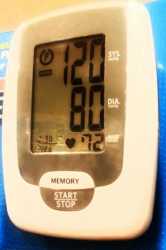Pediatrics: Left and Right Arms Can Have Different Blood Pressures in Children
 MedicalResearch.com: What is the background for this study? What are the main findings?
Response: Hypertension in children is a growing problem around the world, but when diagnosing hypertension, most of the time blood pressure is only measured in one arm. Our study showed that children can have a blood pressure difference between arms that may be considered significant in a clinical setting. One in four children had a difference between left and right arms that could mean that blood pressure appears normal in one arm, but in the other arm it would be classified as a high blood pressure. This means that if a doctor measures blood pressure in one arm only, a diagnosis of high blood pressure could be missed. (more…)
MedicalResearch.com: What is the background for this study? What are the main findings?
Response: Hypertension in children is a growing problem around the world, but when diagnosing hypertension, most of the time blood pressure is only measured in one arm. Our study showed that children can have a blood pressure difference between arms that may be considered significant in a clinical setting. One in four children had a difference between left and right arms that could mean that blood pressure appears normal in one arm, but in the other arm it would be classified as a high blood pressure. This means that if a doctor measures blood pressure in one arm only, a diagnosis of high blood pressure could be missed. (more…)Chronic Kidney Disease: More Patients Would Benefit from Lower Blood Pressure Targets


Postural Orthostatic Tachycardia Syndrome in COVID Long-Haulers May be Helped by Ivabradine
Systolic Interarm Differences in Blood Pressure Linked to Increased Cardiovascular Events and Mortality
Should Children and Teens Be Screened for High Blood Pressure?
Elevated Blood Pressure At Night Linked to Increased Risk of Heart Disease
Orthostatic Hypotension Linked to Increased Dementia Risk
Where You Take Your Blood Pressure Matters
Thin Legs and High Blood Pressure
Hypertension Treatments with Chlorthalidone vs HCTZ: Cardiac and Safety Outcomes
Which Blood Pressure Medications Are Better For Patients At Risk of Gout?
Blood Pressure Variability in Mid-Life Associated With Greater Cardiovascular Risk
Hypertension Guidelines Often Give Inconsistent Recommendations
Chronic Strenuous Physical Activity At Work Could Harm Cardiovascular Health
Obstructive Sleep Apnea Common in Patients with Resistant Hypertension
White Coat Hypertension Calls for Close Blood Pressure Monitoring
Not Just in the Clinic: Day and Night Blood Pressures Linked to Heart Disease Risk in African Americans
Smart Phone Camera May Be Able To Monitor Your Blood Pressure
RESPECT Study: Intensive Blood Pressure Control Better for Secondary Stroke Prevention


Elevated Systolic Blood Pressure Linked to Increase in Valvular Heart Disease
Study Emphasizes Need to Establish Optimal Pressure Combination Therapies by Ethnicity
Lowering Blood Pressure Target Would Greatly Increase Number of People Diagnosed with Hypertension
Effects of Morning Exercise With/Without Breaks in Sitting on Blood Pressure
Does Salt Help or Worsen Lightheadedness?
Blood Pressure Control – Good for Heart, Good for the Brain!
Undiagnosed Sleep Apnea Linked to Resistant Hypertension in African Americans
Why is Blood Pressure in Women More Sensitive to High Salt Diet?
MedicalResearch.comInterview with:


Eric J. Belin de Chantemèle, D.Sc.
Associate Professor
Department of Medicine, Cardiology
Vascular Biology Center
Medical College of Georgia at Augusta University


Jessica L Faulkner, PhD
Post-doctoral Fellow
Vascular Biology Center
Medical College of Georgia at Augusta University
MedicalResearch.com: What is the background for this study? What are the main findings?
Response: It is generally accepted in the medical community that women are more salt sensitive than men. By “salt sensitive” we mean that blood pressure increases with increases in salt in the diet.
While we have known for a long time that women are more likely to experience problems with their blood pressure that are associated with the salt that they eat, the reasons why remain largely unknown and, therefore, the best way to treat it is also unknown. With the average American eating roughly twice the salt recommended by the American Heart Association guidelines, the effects of dietary salt on blood pressure are very important. Our latest publication in the journal American Heart Association’s journal Hypertension shows that female mice are more prone to high blood pressure when on a high salt diet than males.
MedicalResearch.com: What should readers take away from your report?
Response: Our report begins to shed some light on why women may have a greater risk of developing high blood pressure due to eating too much salt. We recently found that a hormone, termed “aldosterone” is acting inappropriately in females in response to a lot of salt in the diet. In healthy individuals who are not salt sensitive, aldosterone is decreased by salt in the diet and is protective to the blood vessels. However, in female mice it is less likely that aldosterone will be decreased, and this lack of decrease of aldosterone leads to blood vessel damage and high blood pressure in our study.In contrast, our male mice in our study suppressed aldosterone when given a high salt diet, and did not develop blood vessel damage or high blood pressure.We believe this variation in aldosterone production in women may be a reason why they are clinically more likely to have a blood pressure response to high salt diets.
Heart Attacks Spike During Holiday Season – How Can You Minimize Your Risk?
Millions of Cardiovascular Events Preventable If New Lower Blood Pressure Guidelines Adopted
- Prevent 3.0 million CVD events compared to currently blood pressure and treatment levels
- Prevent 0.5 million more events compared to achieving and maintain JNC7 goals
- Prevent 1.4 million more events compared to achieving and maintain JNC7 goals
- Achieving and maintaining the lower blood pressure thresholds for antihypertensive medication initiation and titration by the 2017 guidelines, are projected to prevent ~20% and ~90% more CVD events over ten years compared to achieving and maintaining JNC7 or JNC8 goals respectively.



















